Understanding Keyword Ranking Drops & Search Volatility
You open up your monthly reports and notice a downward trend in your keyword rankings—what’s your first action?
Most likely, you’re reaching out to your SEO team, wondering what exactly happened. Clearly, something isn’t working—otherwise, why would you suddenly lose 12 positions overnight?
Are Ranking Drops a Sign Your SEO Isn’t Working?
Fortunately, no. But the answer is more complex than you may think.
Why Ranking Drops Happen

Ranking drops are common across all industries, and they primarily occur when a search engine like Google or Bing releases an algorithm update or if they decide to test a keyword or keyword phrase.
They could also occur if your website does not contain the information or resources your audience is looking for when searching specific terms or if your content is outdated and missing vital information.
Explaining Search Volatility
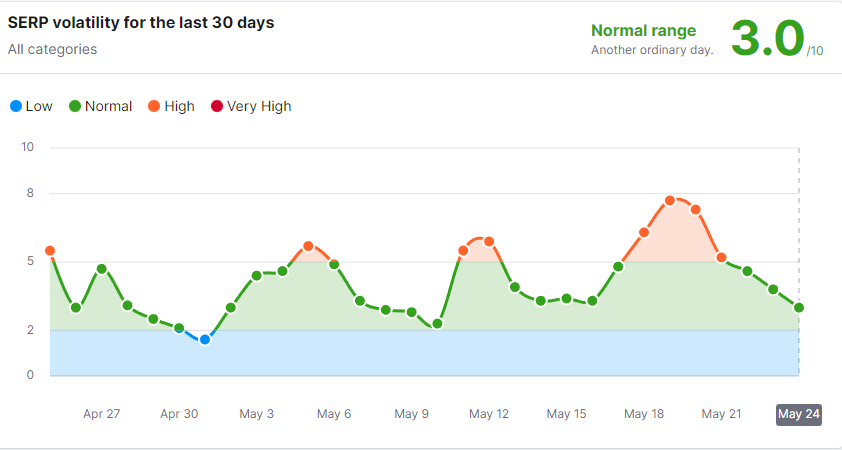
As previously mentioned, most cases of keyword volatility (keyword rankings significantly moving up or down with seemingly no rhyme or reason) are due to algorithm updates and keyword testing.
Google generally announces when they release updates, and provides a list of current and past updates. Whenever these announcements drop, SEO experts always plan for keyword drops and what’s known as search volatility.
Search volatility is when search engines frequently change which content appears on the results page after a user submits a query. The search engine results pages (SERPs) can change on the hour, and in some instances, within seconds.
Search Volatility in Action
You might be thinking: “Search engines can’t change that often.”
Well, actually, they do. When you search a keyword phrase, the results will vary based on where you’re searching from (location) and the search engine you’re using (Google versus Yahoo). And even when using the same search engine and performing searches in the same location, search engines may test specific keyphrases.
Examples of Search Engines Testing Keyphrases
In February of this year, I tracked a broad keyword, “deep sleep,” for one week on Google. The results were never the same. It’s also important to note that no algorithm update had rolled out in February (during the time of research), nor was there an update in progress.
Deep Sleep: Day 1 (February 14, 2023)
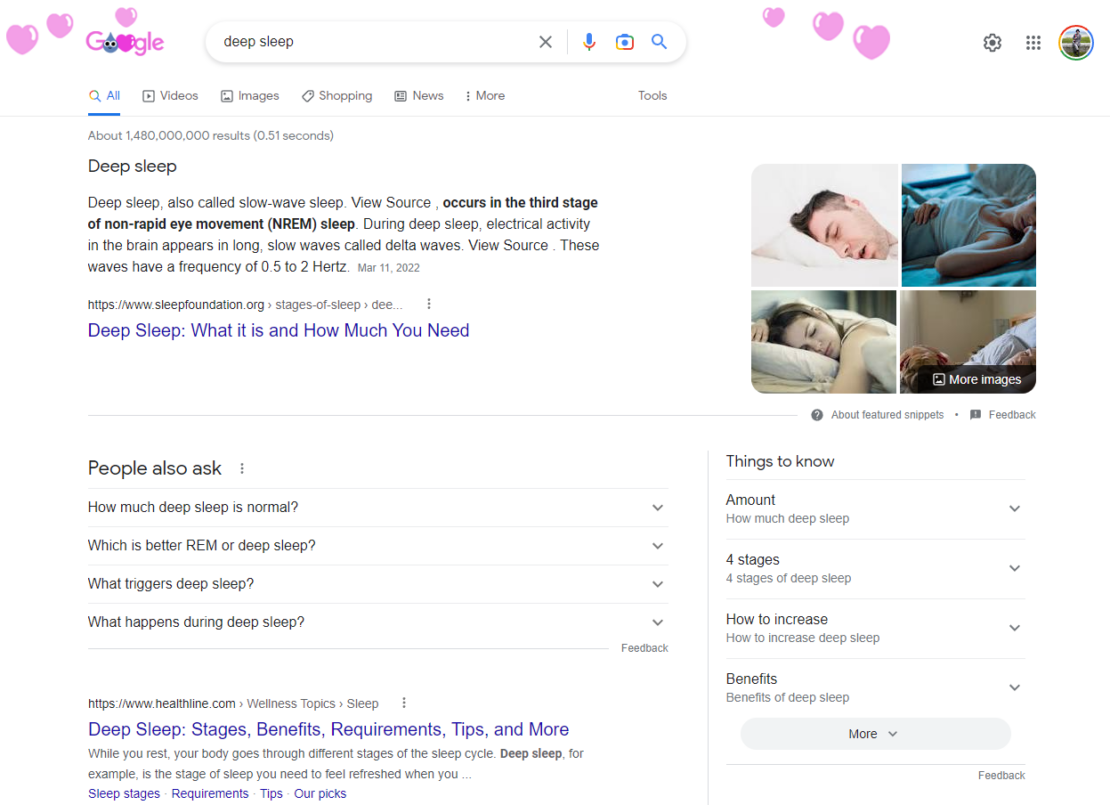
What you’ll notice from the screenshot is that Sleep Foundation holds a featured snippet for “What is deep sleep?” and to the right of the featured snippet is what’s called an image pack.
Directly underneath the featured snippet is a People Also Ask (PAA) section highlighting other questions people seek answers to when searching ‘deep sleep’ on Google.
There is also a ‘Things to Know’ widget that quickly covers information users are looking for. Please look closely at what is covered under Things to Know: Amount, 4 stages, How to increase, and benefits, because it changes.
Deep Sleep: Days 2 & 3 (February 15 & 16, 2023)
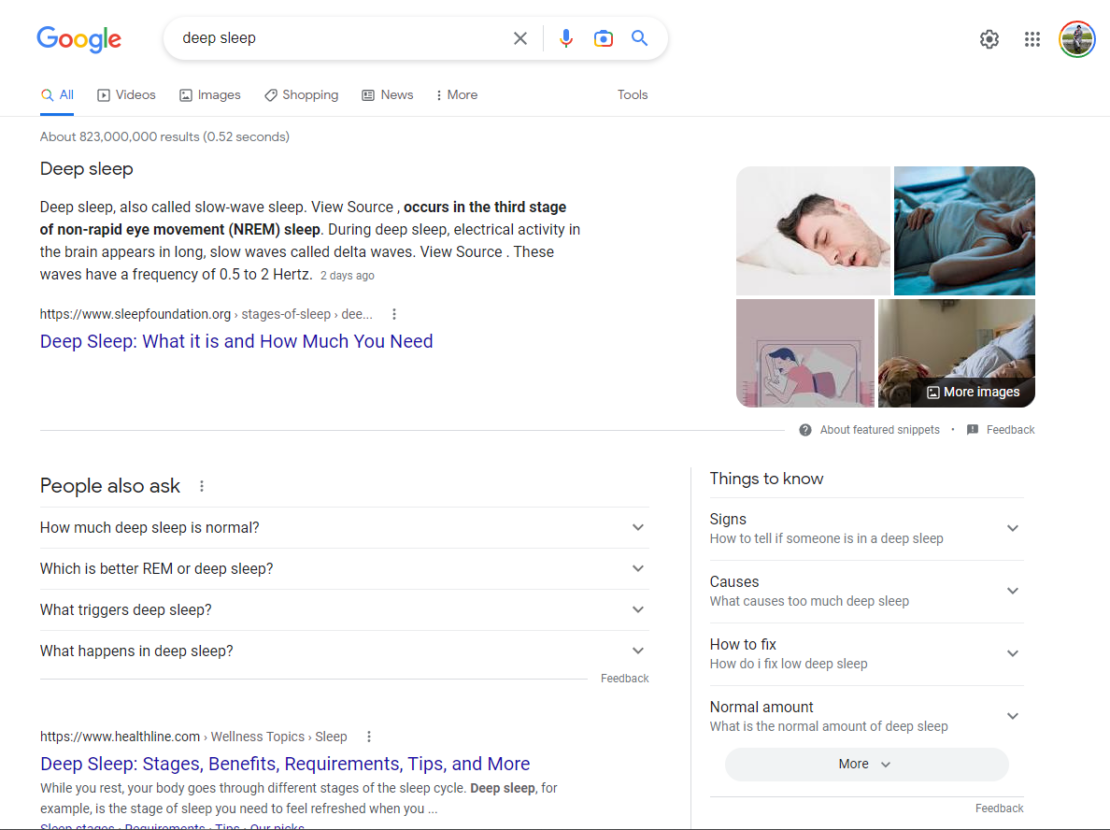
Days number two and three are combined because there weren’t many changes. The featured snippet and image pack mostly remained the same.
However, the PAA changed slightly, so the ‘What happens in deep sleep?’ question appears before ‘What triggers deep sleep?’
Perhaps because users searching ‘deep sleep’ are most often clicking on content that explains how deep sleep works versus articles that discuss the causes of deep sleep.
The Things to Know widget also changed. On February 14, the Things to Know covered: Amount, 4 stages, How to increase, and benefits. Now, it’s covering: signs, causes, how to fix, and normal amount.
Another interesting change is that Google added a video playlist to the SERPs (pictured in the second screenshot below). Beyond that, nothing much had changed, other than some of the articles displayed in the screenshot changing positions each day (for example, the WebMD article might appear before Medical News Today on one day but then drop back down the next).
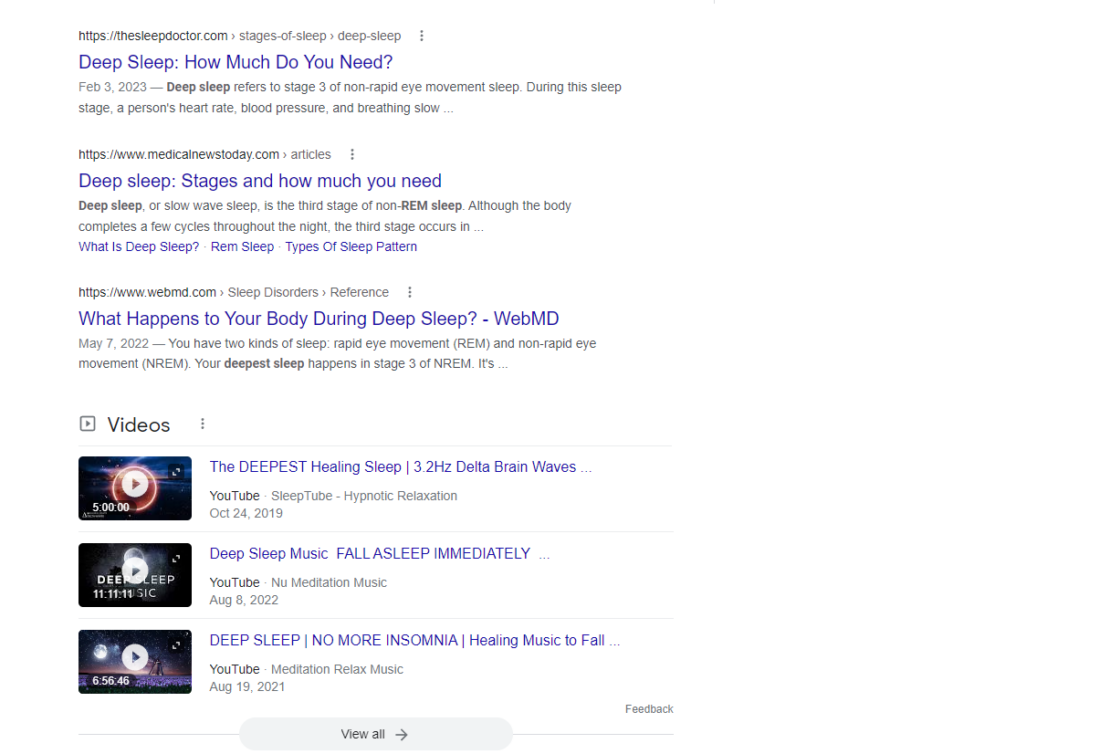
Deep Sleep: Days 4 & 5 (February 17 & 18, 2023)
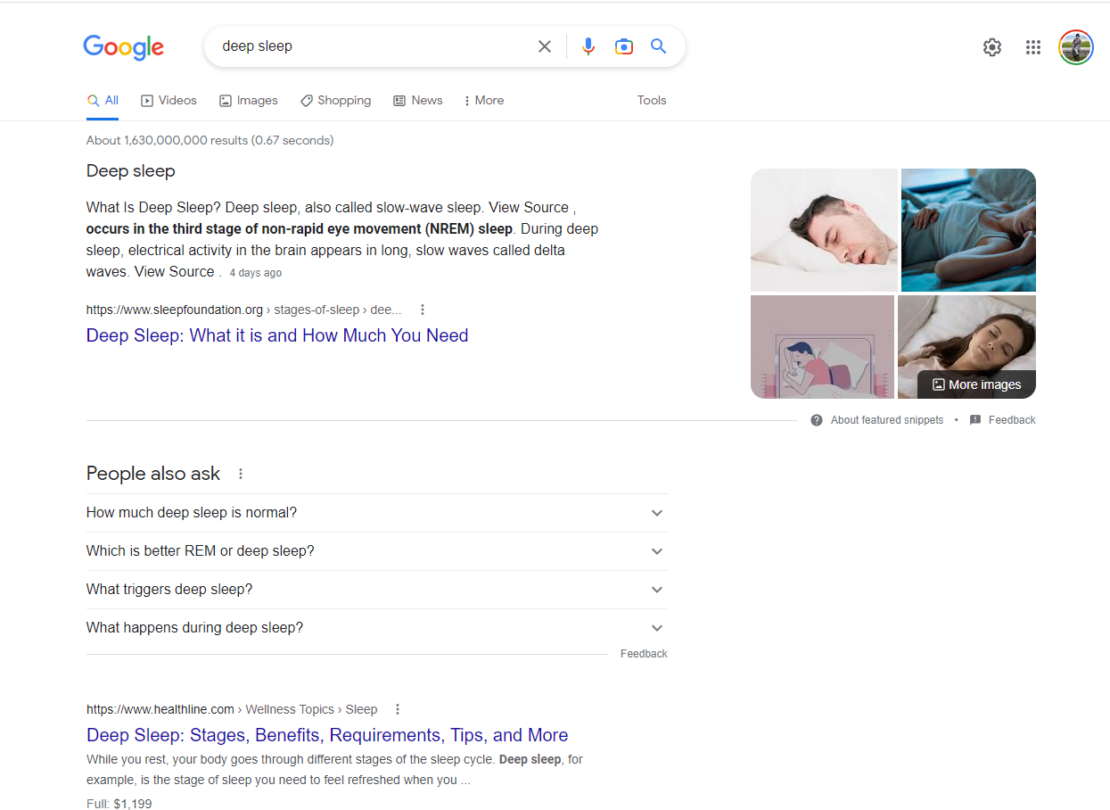
The featured snippet has not changed, but you’ll see that the Things to Know widget completely disappeared. The PAA remains mostly the same, except the ‘What triggers deep sleep?’ and ‘What happens during deep sleep?’ have switched positions again.
What’s not shown in the screenshot is that on this day, the YouTube music playlist mysteriously disappeared and was replaced with a ‘Top Stories’ section related to deep sleep/deep sleep research.
The SERPs mostly stayed the same on day 5, too. The Things to Know widget was still mysteriously gone, and the featured snippet, PAA, and image pack remained (mostly) the same. Have you started to notice that the images within the image pack are also changing/reordering?
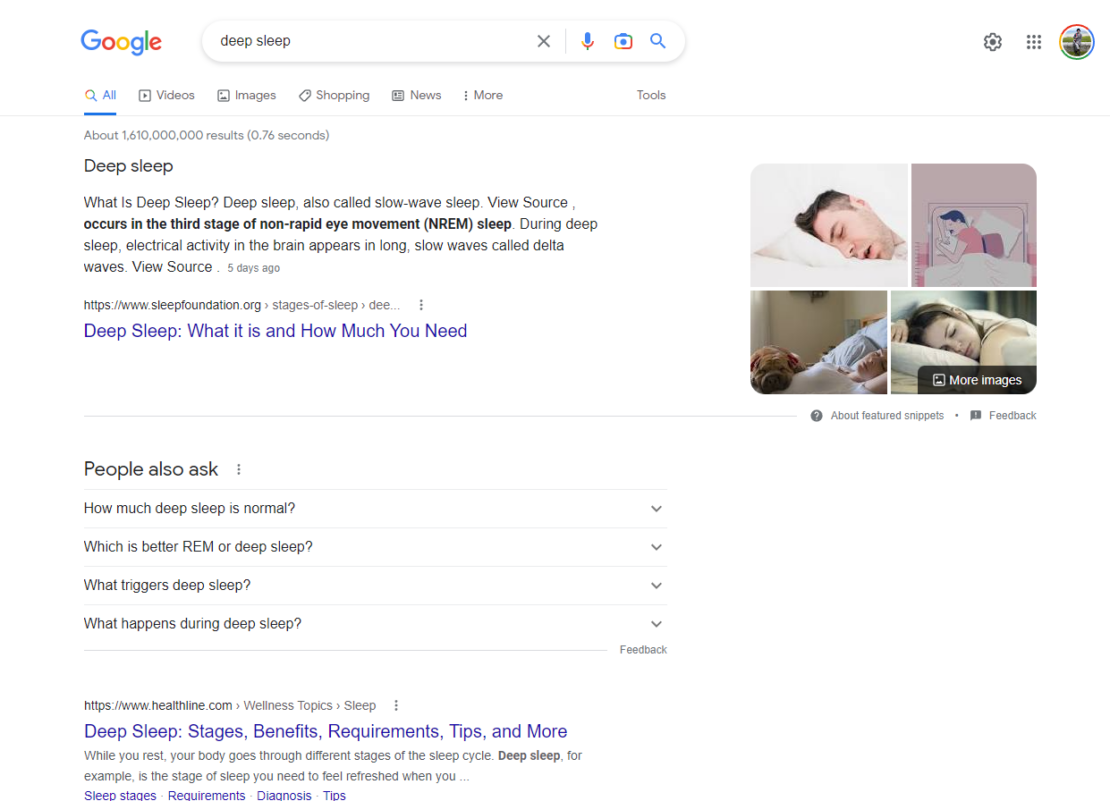
Deep Sleep: Day 6 (February 19, 2023)
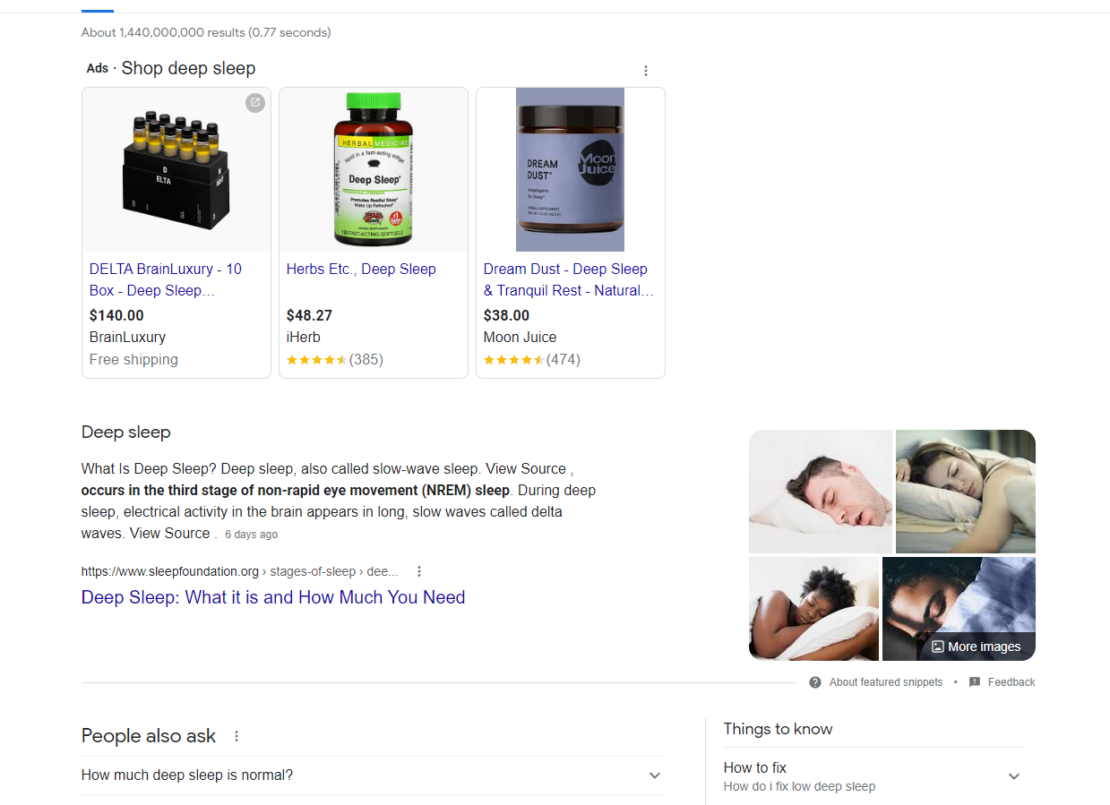
Google surprised me on February 19 by adding sponsored ads to the top of the SERPs just before the featured snippet.
The image pack also included new images, and the Things to Know widget made a comeback! The Things to Know Widget on that day included: How to fix, length, effects, and how to decrease.
The PAA section got cut off in the screenshot, but there weren’t any significant changes to it other than ‘What triggers deep sleep?’ and ‘What happens during deep sleep?’ switching positions again.
Deep Sleep: Day 7 (February 20, 2023)
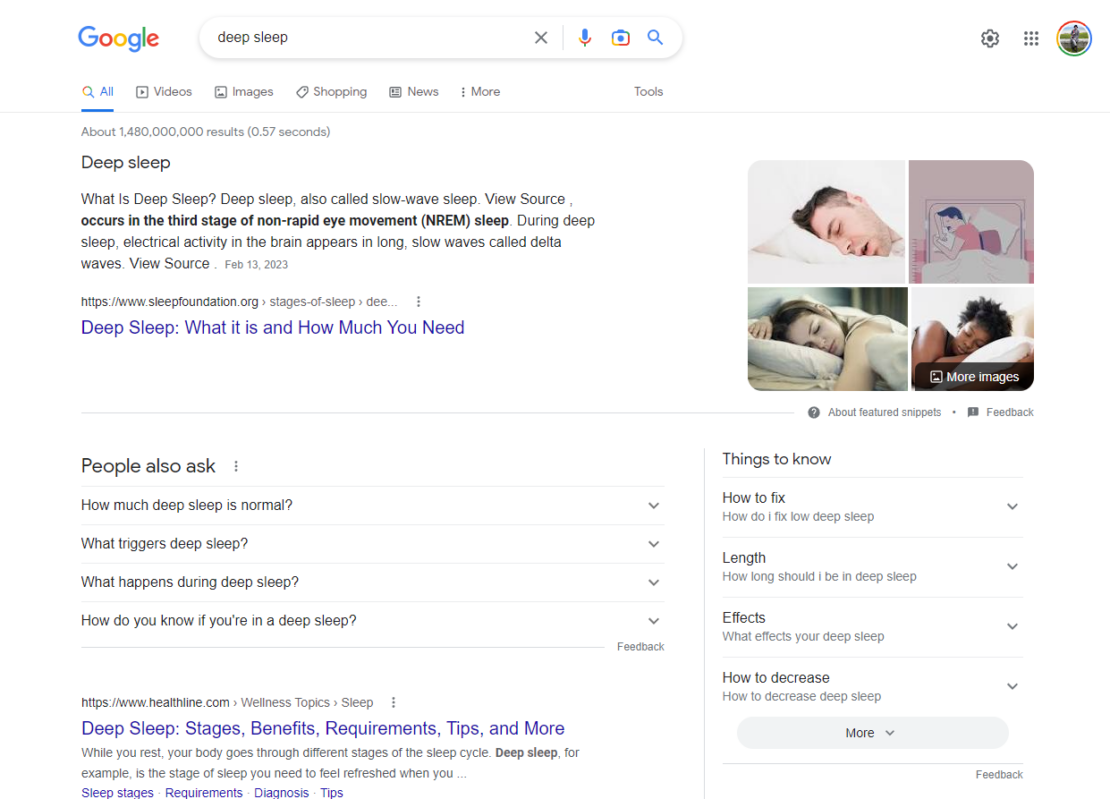
The sponsored ads are gone (that was fast!), and the image pack changed again. The PAA section mostly remained the same, except that the ‘Which is better REM or deep sleep’ question was replaced with “How do you know if you’re in a deep sleep?” and the order of the questions changed.
Deep Sleep Today
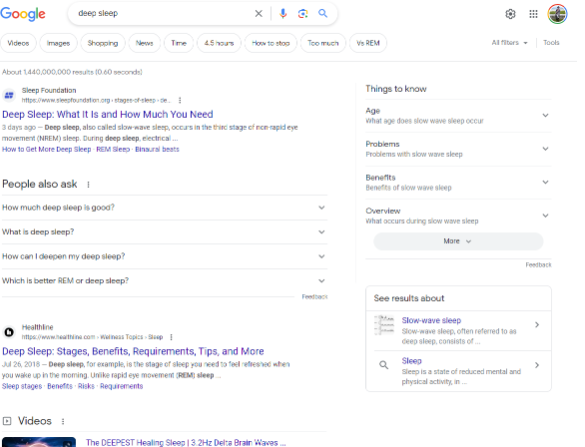
This is what the ‘deep sleep’ SERPs looked like on the day this article was written (after several months and algorithm updates have passed).
You can see that the featured snippet is gone, although Sleep Foundation still holds the number one position on the page, the image pack is gone, and the Things to Know widget has remained, although the content within it has changed.
The PAA is also different, and Google has kept a YouTube playlist of deep sleep-enhancing music in the results.
You’ll also notice at the top of the page, under the search box, a list of tabs that can be clicked on to further filter the results (e.g., videos, images, shopping, news, vs. REM).
Why Should You Care About Search Volatility?
Going back to the deep sleep example, what do you think happened to the content pieces previously housed under the ‘Things to Know’ widget after it completely disappeared or was rearranged?
Well, that company most likely saw a drop in rankings.
Even if the SERP changes are minor, they’re still changing. Several publications, including The Sleep Doctor, Medical News Today, and WebMD, were fighting for positions throughout this week-long experiment. The only publication that consistently remained in its spot was the Healthline article shown in all the screenshots.
No one knows when Google, or any search engine, will test a keyword or phrase. When this happens, it’s because Google (or other search engines) aren’t quite sure of the particular information users are searching for, so they’re changing the results based on user feedback.
If your rankings have dropped, it’s not necessarily a sign that your content is bad or that your campaign isn’t working—it’s highly likely that there is an algorithm update at play or that the particular keyword you’re ranking for is being tested.
What to Do After Ranking Drops & Algorithm Updates
After experiencing any drop in rankings, your instinct will be to make any immediate change to reverse the effects, but this can make it worse for you in the long run. Your best bet is to stay calm, wait, and analyze (or ask your SEO team to look into it).
In some situations, your rankings will recover naturally, especially if it’s the result of a search engine testing a keyword or keyphrase.
If they don’t recover naturally, there’s still hope.
Additional Steps You Can Take
1. Check Google’s Algorithm Update List
Waiting is especially important if your rankings fluctuate due to an algorithm update. Check Google’s updates list. If an algorithm update is in progress, it will most likely affect your rankings. These updates generally take two to three weeks to complete and an extra week or two to analyze what changed with the update. Remember—your SEO team cannot necessarily predict when Google will roll out algorithm updates or know the results from the update, but they can help you perform an analysis.
2. Analyze the SERPs for Your Tracked Keywords
What type of content appears when you search for specific keywords you’re tracking? Does it tend to be more commercial-focused (explaining or highlighting services, etc.), transactional (product pages, shopping ads, etc.), or informational (how-to blogs, etc.)
Now, look at the content you’ve produced targeting those specific keywords. Do they contain information a user is looking for? Is the content comprehensive, or is it missing important information? Does it need to be updated?
3. Use Third-Party Volatility Sensors
Most third-party SEO tools, including Moz and SEMrush, feature handy volatility sensors you can use to see how “hot” or volatile search engines were on a particular day or during a specific period. These tools can be helpful if you’ve already confirmed that there wasn’t an official algorithm update, and they can also help you potentially predict unconfirmed algorithm updates.
4. Potentially Target New Keywords
If you’re only targeting broad keywords in your content, you will have difficulty maintaining consistent keyword growth. Broad keywords experience the most volatility specifically because they are, well, broad.
Search engines don’t necessarily know what people are looking for when they’re searching for these broad terms, so the SERPs will constantly change to improve user experience. Additionally, ranking highly for broad keywords means you must have a lot of (trustworthy) information on your website on that topic. This takes time to build, so if you are just starting SEO, don’t expect to rank for broad keywords overnight—it can take months, sometimes even years.
When you’re creating content, research long-tail keywords that are relevant to your broad keyphrases. Going back to the ‘deep sleep’ example, targeting ‘what is deep sleep’ or ‘REM versus deep sleep’ is much easier than targeting only ‘deep sleep.’
Do You Need Help Analyzing Your Ranking Drops?
Remember—gaining and losing keyword positions is a normal part of SEO. It can be confusing and aggravating when it happens, but that’s why SEO specialists are here. If you don’t have an in-house SEO team, contact Momentum today to schedule a consultation.
Founded in 2010, we’re a digital marketing agency offering website design and development, SEO, and pay-per-click advertising services to clients in many industries. We’re happy to help you analyze your current SEO performance and provide guidance on the best course of action for your business.
